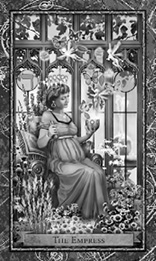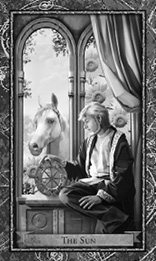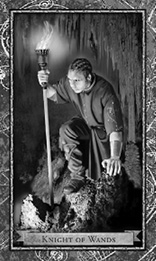The Houses of the Horoscope
Horoscope Charts
The planets, signs, and houses all come together in a horoscope chart—a visual snapshot of the sky at a given point in time. Like a map of the cosmos, it’s a convenient way to plot the positions of the planets in the signs, and the houses are a convenient way to divide the chart into manageable sections.
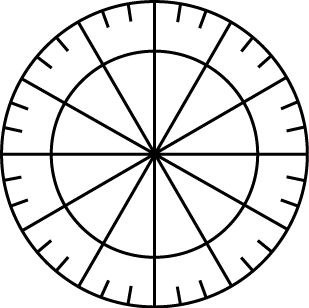
The word horoscope actually comes from the Greek word hora, or hour, plus skopos, watching. An astronomer could read a horoscope chart like an atlas of the solar system. Astrologers and tarot readers, however, can read a horoscope chart like a treasure map, filled with symbols that describe our journey through life.
Divisions of Space and Time
You’ve already seen horoscope charts in this book—but only in the context of tarot cards. Horoscope charts, in fact, were the basis for distributing the cards around the Wheel of the Year.
You probably noticed that every horoscope chart is a circle, designed to represent our view of the solar system from our position on earth. Every horoscope chart is also divided into twelve pie-shaped houses—one for each sign of the zodiac. The word zodiac, in fact, is Greek for “circle of animals.”
Like any map, astrologers use the houses of a horoscope chart to pinpoint the positions of the planets as they move through the signs. One look will reveal the sign each planet is passing through, as well as the planets’ relationship to one another.
While the houses might add a layer of complexity to astrological analysis, they also offer valuable context and background information of their own.
The sun is in a different sign of the zodiac every month—but it moves through the twelve houses of a horoscope chart every day. The rest of the planets do, too. That’s because we’re not just revolving around the sun, facing a new sign of the zodiac every month. The earth is also spinning on its axis, making a full rotation every twenty-four hours. In the process, every location on earth faces a different sign of the zodiac for about two hours at a stretch.
Don’t be too confused by this concept: just picture the Sun moving across the sky over the course of the day, rising in one location and setting in another. If you were to plot the sun’s movement on a map of the sky, you would simply mark its travel by charting its path along the way.
That’s what happens on a horoscope chart, too: the sun, the moon, and the planets all move through the houses of the horoscope as the earth gently cycles through space. The houses of the horoscope simply illustrate our rotating view of the solar system as we spin in place.
The houses are a useful astrology tool because they offer a measure of context, perspective, and background information about the planets as they move through the signs.
True to their roots, the houses derive much of their significance from the zodiac signs.
The Natural Horoscope
In a natural horoscope—an idealized map of the sky—each house of a horoscope is ruled by one sign of the zodiac. And because every sign is ruled by a planet, every house of the horoscope has a planetary ruler, too. Aries, for example, rules the first house. The planet Mars rules Aries. Together, that means Aries and Mars are always associated with the first house of a horoscope.
In real life, however, there’s no such thing as a perfect natural horoscope chart, with every planet in its own sign, and every house occupied by its rightful owner. That’s because the planets are constantly on the move, perpetually orbiting the sun. Along the way, they pass through every sign of the zodiac—not just their own. Given that there are twelve signs to visit, it’s not hard to see why most planets don’t spend much time in their own sign.
Throw in the fact that our view of the houses is constantly changing, too, and you’ll soon realize that we’re not likely to find a planet in its own house, either. That’s because we calculate the houses based on our own perspective, as the Earth rotates on its axis. From our standpoint, the planets are constantly cycling through all twelve houses of the horoscope. Ultimately, when a planet actually does land in both its own sign and its own house on a horoscope chart, it’s almost a happy accident.
Even so, astrologers keep the natural horoscope in mind when they assess a chart, because the planets and signs that naturally rule a house always have a certain measure of power in them. The planets and signs might be absentee landlords, but they’re still the owners of each house, and their presence can be felt even when they’re not at home.
Zodiac Houses
In the next few pages, we’ll study the houses, one by one. Here’s a brief overview of the significance of all twelve houses, along with their ruling signs and planets.
|
House |
Rulership |
Ruling Sign |
Ruling Planet |
|
First House |
Physical appearance, |
Aries, the Ram; associated with leadership |
Mars, planet of energy and aggression |
|
Second House |
Money, possessions, |
Taurus, the Bull; associated with property |
Venus, planet of love and attraction |
|
Third House |
Communication, siblings, neighborhoods |
Gemini, the Twins; associated with communication |
Mercury, planet of speed and communication |
|
Fourth House |
Motherhood, home, |
Cancer, the Crab; associated with protection and nurturing |
The Moon, orb of reflection and feminine cycles |
|
Fifth House |
Creation, procreation, and recreation |
Leo, the Lion; associated with courage and showmanship |
The Sun, source of energy and enlightenment |
|
Sixth House |
Work, duty, responsibility, service to others |
Virgo, the Virgin; associated with health and cleanliness |
Mercury, planet of speed and communication |
|
Seventh House |
Marriage, partnerships, intimate relationships |
Libra, the Scales; associated with justice, equality, and balance |
Venus, planet of love and attraction |
|
Eighth House |
Sex, death, |
Scorpio, the Scorpion; associated with the dark mysteries of life |
Pluto, planet of death, |
|
Ninth House |
Philosophy, long-distance travel, higher education |
Sagittarius, the Archer; associated with honesty and exploration |
Jupiter, planet of luck |
|
Tenth House |
Ambition, status, career, and public image; fathers and authority figures |
Capricorn, the Goat; associated with work and rewards |
Saturn, planet of structure, boundaries, and limitations |
|
Eleventh House |
Social groups, causes, long-term thinking |
Aquarius, the Water Bearer; associated with visions of a |
Uranus, planet of independence, revolution, |
|
Twelfth House |
Psychic ability, the occult, hidden places |
Pisces, the Fish; associated |
Neptune, planet of |
Astrology in Action: The Houses
of the Horoscope Spread
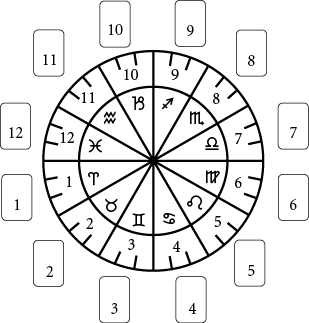
The houses of the horoscope lend themselves naturally to use as a tarot spread—even without an actual horoscope chart in hand. The twelve cards in the spread derive their significance from the houses of the horoscope and the signs and planets that naturally rule each house.
Notice that the cards are laid out in the same order the houses appear, starting with the first card in the nine o’ clock position, and moving counter-clockwise around the wheel.
- Aries: Self-awareness, leadership, drive, and initiative; physical appearance, first impressions
- Taurus: Money, possessions, values, security, creature comforts, material resources
- Gemini: Communication, thought process, siblings, neighborhoods
- Cancer: Motherhood, home, and family; the ability to nurture and be nurtured, intuition
- Leo: Creation, recreation, procreation, and children
- Virgo: Work, duty, service, health, attention to detail, and inheritance
- Libra: Marriage, partnerships, intimate relationships, balance, and social skills
- Scorpio: Sex, death, joint resources
- Sagittarius: Philosophy, long-distance travel, higher education
- Capricorn: Ambition, status, career, and public image
- Aquarius: Social groups, causes, inventiveness, futuristic and long-term thinking
- Pisces: Psychic ability, the occult, hidden places, the subconscious mind, psychological health
Sample Reading: Rose’s Romance
Rose, a twenty-one-year-old education major, hasn’t had a boyfriend—or even a date—for the last year. “I just want to know what I should be looking for in a man,” she said. “What are my prospects for romance?”
A houses of the horoscope spread, with cards pulled randomly from a well-shuffled tarot deck, offers a starting point for analysis.
Surprisingly, it seems that Rose’s search for love and romance is closely tied to her career goals—and that romance won’t be in the cards until she can align her love life with the rest of her life’s dreams and plans.
- Two of Wands: The young and handsome Mars in Aries—a younger version of the Emperor—suggests that leadership and drive is important to Rose—both in herself and in a partner.
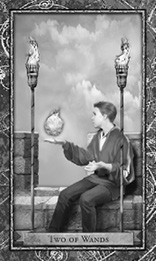
- Queen of Wands: The fiery Queen of Wands, who rules most of Aries, points out that Rose’s priorities extend into the realm of money and possessions, too. Rose wants a boyfriend with a job and a future—just as she expects to establish herself in a secure profession, too.
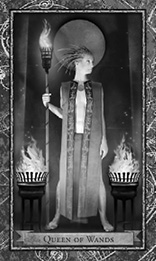
- Page of Cups: The Page of Cups personifies the element of water, and symbolizes lessons and messages about relationships. The third house describes sibling connections and communication styles. Rose has always shared a close bond with her sister, and the card’s placement here suggests that Rose learned much of what she knows about relationships from her sister.
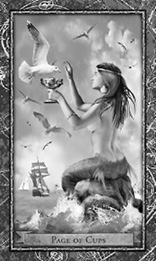
- Queen of Pentacles: The earthy Queen of Pentacles, who rules most of Capricorn, addresses Rose’s need for physical comfort and stability. The fourth house describes motherhood and nurturing. Rose identifies closely with her mother, and she hopes to provide for a family of her own someday. Her choice of a partner and a mate plays a crucial role in that plan.
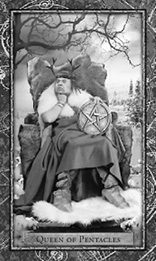
- Three of Wands: The fifth house is the house of creativity, procreation, and recreation. The fiery Three of Wands—a depiction of the Sun in Aries—suggests that Rose wants a man who can inspire her and fuel her creative drives. In tarot, Threes often symbolize creativity, because they represent the children—literal or symbolic—that are born of partnerships.
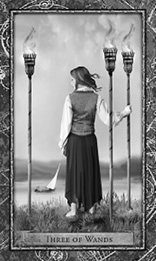
- The Star: which embodies the vision and ideals of futuristic Aquarius, has fallen in Rose’s sixth house of work, duty, responsibility, service to others. As a future teacher, Rose has chosen an idealistic profession, and she’ll need a partner who can support her in that cause.
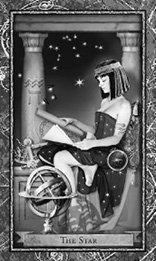
- The World: Rose certainly has high hopes—and high expectations—when it comes to sixth-house issues of partnership and marriage. Just as Saturn’s rings define its outer boundaries, Rose might have a tendency to define herself by the people she attracts, which could be why she’s being so particular about the men she dates.
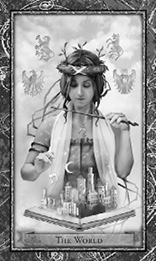
- Four of Swords: The eighth house describes joint resources that stem from partnerships and intimate relationships. The unconscious knight on the Four of Swords suggests that Rose could ultimately benefit from a certain amount of luck in this department. It corresponds to Jupiter in Libra, which blesses everything it touches with good fortune. Of course, the fact that Rose hasn’t fallen for any of her suitors so far could indicate that Rose is making a calculated decision to wait for her lucky break, until she finds a partner with assets to share.
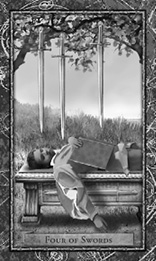
- Six of Cups: Here we see Rose’s career goals merging once again with her relationship ideals. The ninth house is home to her philosophy and higher education—which, in this case, focuses on teaching children like those in the Six of Cups. Astrologically, the card corresponds to the Sun in Scorpio—the Lord of Pleasure. Scorpio can be intensely nostalgic. On some level, it’s possible that Rose is hoping for a reunion with a former boyfriend.
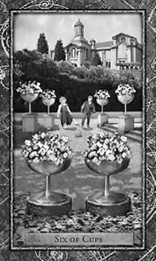
- Ten of Cups. The happy family in the Ten of Cups makes another child-focused appearance in the tenth house of ambition, status, career, and public image. Astrologically, the Ten of Cups corresponds to Mars in Pisces—the Lord of Perfected Success. Rose won’t accept anything short of a “perfect” mate, job, or family life.
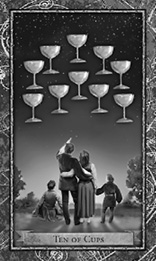
- King of Wands. The fiery King of Wands, who rules most of Leo, brings a sense of passion and commitment to Rose’s eleventh house of social groups and causes, as well as her long-term vision and plans.
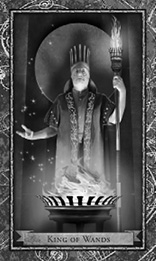
- The High Priestess. Despite the overwhelming focus on career in the rest of this reading, the mystical High Priestess makes an appearance where she’s comfortable: in the twelfth house of psychic ability, the occult, and hidden places.
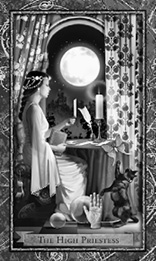
Houses of Cards
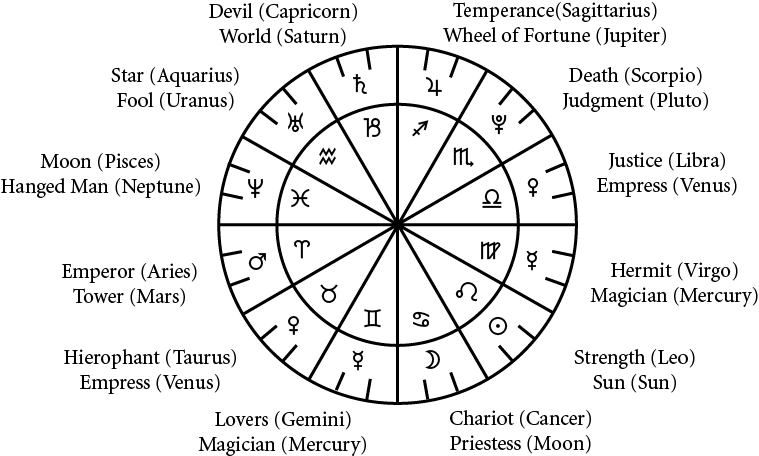
All of the planets and signs—and by association, tarot cards—occupy their own houses in a natural horoscope.
The Houses of the Horoscope
Each house of a zodiac chart represents a separate area or zone of activity. As you explore the twelve houses, visualize them as rooms in a house, with each room dedicated to a specific function. To get a feel for the signs and planets in the houses, picture them in the guise of their tarot-card counterparts. Simply think of the planets and signs as the people who live in each room.
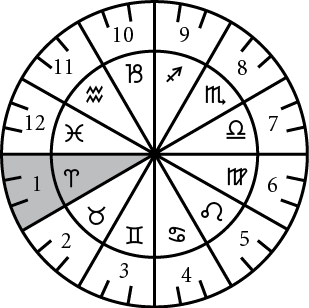
First House
If a zodiac chart were a real home, the first house would be the front entry. It describes first impressions, physical appearance, and the public face we show the world.
In fact, for many astrologers, the first house really is the entrance into a chart, because it represents the first thing we notice about anyone we meet. It’s a natural starting point for analyzing a horoscope.
The first house is ruled by Aries, which means it’s the natural outpost of Aries’ signature card, the Emperor. He’s the king of the castle—and he’s perfectly at home in the first house, guarding the front door and deciding who will gain admission to the inner chambers.
Aries is ruled, in turn, by Mars, the red planet of energy and action. That adds some Tower energy to the first house of the horoscope. A tower, after all, is designed to impress friends, intimidate foes, shelter valuables, and protect the inhabitants from would-be assailants.
In a real-life horoscope chart, you’ll probably find that other signs and planets in the first house, where they’ll stand guard in the Emperor’s stead. Whether it’s their job to welcome visitors or protect the Tower against potential attacks, they’ll try to fill the Emperor’s commanding presence as best they can. In fact, any planets in Aries or the first house will assume some Aries and Emperor-like characteristics, such as forthrightness and martial assertiveness.
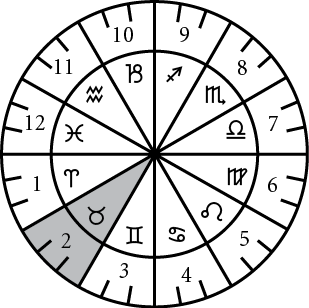
Second House
If a zodiac chart represented a real residence, the second house would be the living room. That’s because the second house describes the material possessions that surround us and make us comfortable and happy—not only physically, but also spiritually. Wealth comes in many forms—money, property, and values—and the second house relates to anything we treasure.
The second house is ruled by Taurus, which means that Taurus’ signature card, the Hierophant, is naturally in charge of the decor. Not surprisingly, the Hierophant favors traditional styles, with richly varnished wood, velvet upholstery, scented candles, classical music, and fine art masterpieces on the walls—like the stained-glass windows of a church.
The Hierophant inherits his taste from his ruling planet, Venus—the Empress’ planet of love, affection, and attraction. Venus rules the throat, which means that both the Hierophant and the Empress will do more than fill their living rooms with furnishings. They’ll also equip their living space with the sound of great music. If they’re not playing orchestral songs on their state-of-the-art sound systems, they’re probably singing hymns, opera, or classics themselves.
In most horoscope charts, you’ll probably find that other signs and planets are sitting in the living room, and that they surround themselves with furnishings and property that appeal to their own tastes and sensibilities. Because they’re still on Taurus’ home turf, however, they’ll naturally assume some of the Hierophant’s craving for comfort, stability, and tradition.
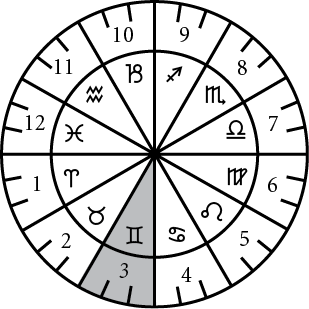
Third House
The third house of the horoscope is the communications center of the home. It’s the room with a computer, a phone, a stack of household mail, and a file drawer filled with birth certificates and important papers. Whether the third house takes the form of a dedicated home office, a desk in the living room, or a corner of the kitchen table, it’s the place where bills are paid, appointments are scheduled, and the details of daily life are managed.
Typically, the third house focuses on routine communications, sibling relationships, and neighborhood affairs. That’s because the third house is ruled by Mercury, the messenger of the gods. His work took him all over Mount Olympus, ferrying communiqués to and from the pantheon of gods—most of whom were related to one another. In fact, the third house also covers interactions with extended family members, such as uncles, aunts, and cousins.
The Gemini Lovers also rule the third house, and their emphasis on communication echoes Mercury’s focus. They’re versatile, engaged, and enmeshed in a busy day-to-day routine. They’re not tidy—but there’s a method to their madness. And like their more organized counterpart, the Virgo Hermit that’s also ruled by Mercury, they can find what they need in a jumbled pile of papers, books, and files.
During the course of your astrology pursuits, you’ll probably find other signs and planets in the third house, which puts them in charge of the communications department. But because they’re still in Mercury’s realm, they’ll try to fill his winged shoes to the best of their own ability.
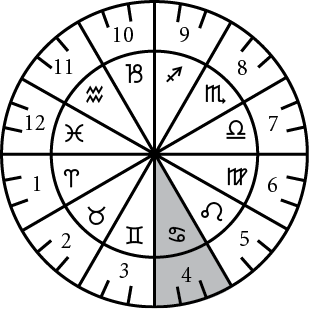
Fourth House
The fourth house, like the kitchen, is the heart of the home, where both body and soul can find nurturing and sustenance. Because the kitchen is usually a mother’s domain, the fourth house usually describes mothers and caregiving parents. Positioned at the bottom of the chart, the fourth house is also the symbolic foundation of a horoscope: it’s the place where we look for information about the foundations of home and family life.
In the natural zodiac, the fourth house is ruled by Cancer. Cancer rules the breasts and stomach, which symbolize the nurturing power of food. Of course, most modern mothers don’t spend a lot of time in the kitchen. Many of them are modern-day Charioteers, commuting to work, and shuttling their children to school and extracurricular events.
Cancer is ruled, in turn, by the Moon, the celestial sphere of reflection and cyclical change. With time and experience, most young mothers will eventually become wise women, like the High Priestess in the Moon card. When you sit down at the High Priestess’ kitchen table, you might feel like you’re having tea with an old, familiar soul—or even a loving, patient grandmother. The Moon’s influence also explains why astrologers look to the fourth house for information about the lunar landscape of childhood memories, dreams, and reflections.
As you build your astrological practice, you’ll probably find that other signs and planets in the fourth house. Just remember that when they’re around, they’re cooking in another woman’s kitchen. They may have their own secret recipes—but their placement means they’ll naturally assume some Cancer characteristics, as well as some of the Moon’s glow.
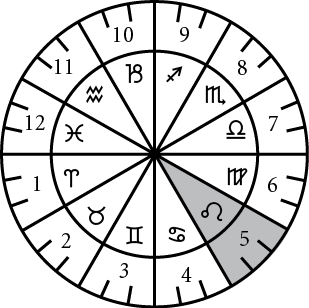
Fifth House
If a zodiac chart represented a real home, the fifth house would be the rec room—because the fifth house is the house of recreation, procreation, and creativity. It’s the house of children and childlike pleasures and pursuits. It’s also a party room; it’s a place for fun and frolic, amusement and play, as well as arts, crafts, and entertainment.
In the natural zodiac, the fifth house is ruled by Leo, which makes it home to the sign’s signature card, Strength. Left to her own devices, the wild child transforms playroom into a lionesque den of amusement and enjoyment. You might find games in the fifth house, or sporting events and athletic competitions. The fifth house sometimes describes gambling; it might even look like a poker room or a casino.
Leo is ruled, in turn, by the Sun, the showman of the zodiac. He uses the fifth house as a stage, where he can perform for the pleasure of his company. Like Apollo, the godlike figure in the Sun card, he’s a golden child—confident, self-assured, and in command. And as the marker of annual events, the Sun is always ready to celebrate birthdays, anniversaries, and special occasions.
During the course of most astrology readings, you’ll probably find that other signs and planets also take the stage in the fifth house—but while they’re in residence, they’ll naturally assume some of the Sun’s zest for life, and the lion’s flair for dramatic play.
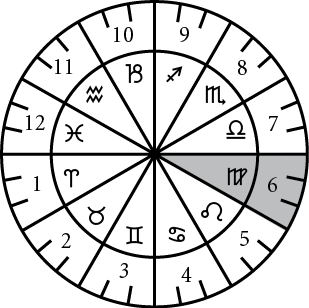
Sixth House
If a zodiac chart represented a real house, the sixth house would be the workspace. It typically takes the form of a home office, but it might also take shape as a workshop or a library, filled with tools and resources to share with others. That’s because the sixth house is the house of service. It describes the work we do in service to others, out of a sense of duty and responsibility.
It’s the natural home of Virgo—who, in the form of the tarot’s Hermit, lives a life of dedication and resolve. In the process, he strives for clean and simple living.
If you see any similarity between Virgo’s sixth-house home office and Gemini’s third-house communication center, it’s for a reason: both Gemini and Virgo are ruled by Mercury, the planet of communication. Here, however, Mercury places special emphasis on the Hermit’s critical thinking and communication skills. Virgo is deeply analytical, and he can drive others to distraction with his attention to detail.
Occasionally, the sixth house might also describe a home’s medicine cabinet, fully stocked with first-aid remedies, healing herbs, and nutritional supplements. That’s because the sixth house traditionally corresponds to sickness and health.
When you work with horoscope charts, you’ll probably find that other signs and planets also operate in the sixth house. Because they’re still in Virgo’s space, they’ll naturally assume some of the Hermit’s focus on conscientious service and well-being.
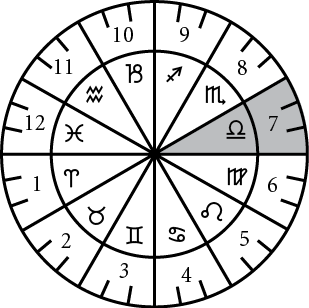
Seventh House
If a zodiac chart represented a real home, the seventh house would be the back door—the “friends and family” entrance to the chart. The seventh house describes marriages, partnerships, and personal relationships—and it symbolizes allies and open enemies alike. It’s the place where astrologers look for information about commitments and lifelong attachments, as well as people who know the intimate details of our private lives, such as doctors, lawyers, and accountants.
The seventh house is ruled by Libra, the sign of relationships. That means it’s the natural outpost of Libra’s signature card, Justice. Like the goddess in the card, Libra carefully weighs both sides of any story, and finds the truth about existence by comparing and contrasting her experience to those of the other people in her life.
Libra is ruled, in turn, by Venus, the Empress-like planet of love and attraction. She’s the archetypal wife and partner of the tarot.
When they’re in charge of welcoming friends and family members at the back door, both Justice and the Empress usher in loved ones with affection and respect. Justice delights in listening to everyone’s stories. The Empress meets her children at the door with cookies, and greets her husband with a kiss.
During the course of your astrological studies, you’ll probably find other signs and planets in the seventh house. Because they’re still in Libra’s domain and the Empress’s home, they’ll naturally welcome guests with their hostesses’ balance, grace, and charm.
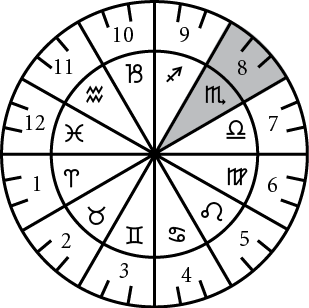
Eighth House
If a zodiac chart represented a real home, the eighth house would be the bedroom—the place where we’re transformed by darkness. That’s because the eighth house is ruled by Scorpio, the master of transformation. After all, we retreat to the darkness for rest and recuperation. We climb into bed at night so we can be reborn in the morning. And when we fall sick at the end of our days, we lie in our deathbed and wait for Pluto’s sweet release.
Pluto, of course, is Scorpio’s ruler. It’s the planet of death, destruction, and deliverance. It’s a chilling fact that planets in the eighth house will often describe how we’ll die—either literally or metaphorically.
Scorpio corresponds to the Death or Transfiguration card. Death never sleeps—but he doesn’t mind lying in state every now and then. His bedroom is a dark refuge, as quiet as the grave, and it’s his favorite place to watch escapist television shows.
In most horoscope charts, you’ll probably find that other signs and planets are sleeping over. When the master bedroom is transformed into a guest bedroom, the visitors will naturally assume some of Scorpio and Pluto’s intensity, drives, desires, and focus. They only pray that they won’t be carried out of the room feet first.
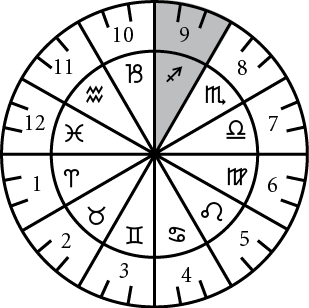
Ninth House
If a zodiac chart represented a real home, the ninth house would be the library. That’s because the ninth house is the domain of philosophy, religion, and higher education—all of which feed the publishing world, too.
The ninth house is ruled by Sagittarius, so it’s the natural outpost of Sagittarius’ signature card, Temperance. Both are explorers, literally and symbolically. They bridge wide distances of time and space to experience the wonders of a far-flung world. They’re restless, and easily bored by routine. It’s their nature to be adventurous and outgoing, meet new people, and test the boundaries of human imagination.
Sagittarius, in turn, is ruled by Jupiter, the planet of luck and expansion. It’s said that travel broadens a person, and like the spinning Wheel of Fortune, the Jupiterian spirit wants to keep growing. Under Jupiter’s divine guidance, we all want to experience the gifts life has to offer, test our luck, and prove our faith in a benefic universe.
What will you find on the shelves of a true Sagittarian library? Philosophy books, of course, along with textbooks on comparative religions and alternative spirituality. You’ll also discover foreign-language dictionaries, maps, and travel guides designed for real-life voyagers and armchair tourists alike.
In a real-life horoscope chart, you’ll probably find that other signs and planets in the ninth house, and that they fill the library with materials that reflect their own spiritual journeys and special interests.
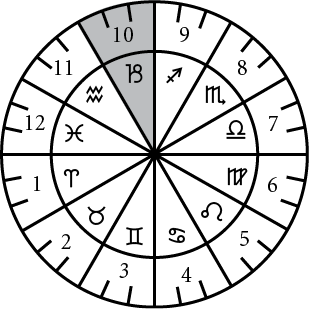
Tenth House
The tenth house is the house of career and social status—both of which often come at great expense. No one understands that cost better than a Capricorn, who will pay almost any price for the privilege that power can bring.
If a zodiac chart represented a real home, the tenth house would be the exterior—the front of the house, visible to everyone, even from across the street or down the block. The size and style of most houses is a clear indication of the occupants’ social status, income, and career success.
The tenth house is ruled by Capricorn, which means it’s the natural outpost of Capricorn’s signature card, the Devil. He lives in the finest house money can buy: an executive mansion.
Capricorn is ruled, in turn, by Saturn, the ringed planet of limitations, restrictions, boundaries, and structure. Like any dark lord, Saturn lives in a world of his own making and design—a gated community, strictly off-limits to those who have no business being there.
As you survey the neighborhood of astrological charts and horoscopes, you’ll probably find that other signs and planets also affect curb appeal. Because they’re still in the Dark Lord’s domain, they’ll naturally assume some of his concern for material possessions, as well as public image and appearance.
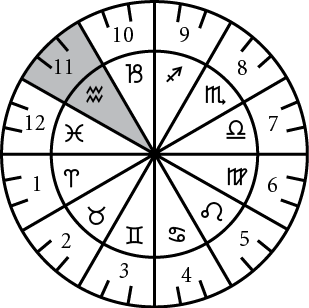
Eleventh House
If a zodiac chart represented a real home, the eleventh house would be the dining room, where fellow travelers and kindred spirits gather around the table to share their hopes, dreams, and visions of a better future.
Astrologers turn to the eleventh house for information about social groups and causes. You might even say it’s a club house, where groups and organizations meet to focus on special interests and long-term goals. If you’ve ever hosted a book club meeting, a PTA planning event, or a reception on behalf of your favorite candidate for city council, you’ve shared your eleventh house with others.
The dining room isn’t the only place where social groups meet, however. It’s not always practical for larger groups to get together in private homes, so some planets move their assemblies to more public places, like coffee houses, community centers, and corporate board rooms.
The eleventh house is ruled by Aquarius. In tarot, Aquarius is represented by the Star—the blithe spirit of space and sky, with a long-range view of the cosmos. She draws kindred spirits into her futuristic realm. Together, they fill the space with utopian dreams and visions.
The Star is ruled, in turn, by Uranus, the planet of revolution and reform. Uranus is a Fool for almost any errand, and will often climb on board any cause the Star supports.
When other signs and planets step into the eleventh house, they bring their own friends and causes with them. Because they’re still in the Star’s heavenly corner of the sky, however, they’ll naturally assume some of her starry-eyed dreams and visionary goals.
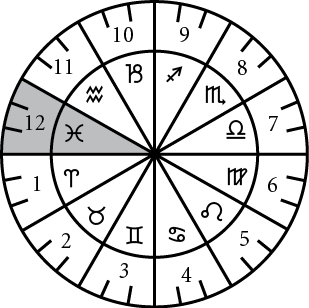
Twelfth House
If a zodiac chart represented a real home, the twelfth house would be a locked room, a secret chamber, or a closet you’re forbidden to open. It might also be a dark and scary basement, or an inaccessible attic. In short, he twelfth house is a place of mysteries and secrets, hidden from view and banished from our thoughts.
Obviously, the twelfth house isn’t always a pleasant place. The things we keep here are those we’d like to hide, both from other people and from ourselves. At their core, those issues represent our most secret fears. They’re the concerns we have to work through, which could include deceptions, hidden enemies, and the issues and torments that we hide away from public view. In some cases, those confinements are literal: the twelfth house occasionally describes the isolation of prisons, asylums, and hospitals.
On a less frightening note, the twelfth house also describes spirituality, psychic ability, mysticism, meditation, past-life issues, and the subconscious. A twelfth house that’s opened and allowed to air out will often lead to stunning—and healing—revelations and discoveries.
The twelfth house is ruled by Pisces. It’s the natural outpost of the Moon’s card, with its deep reflecting pools and an entire underwater world submerged beneath its depths. The goddess of the Moon, like her sister, the High Priestess, can keep any secret until it needs to be revealed.
Pisces, in turn, is ruled by Neptune, the Hanged Man, the mystic visionary who suspends himself in an alternate reality.
As you immerse yourself further, you’ll probably find that other signs and planets in the twelfth house. They have secrets and fears of their own, which they’ll hide away as best they can, and bring to light when the time is right.
Astrology in Action: The Planet, Sign,
and House Spread
Astrologers sometimes describe a horoscope chart as the outline of a drama. The planets are the actors, the signs are the costumes they wear, and the houses are the sets.
A simple three-card spread based on planets, signs, and houses can illustrate almost any personal story, and provides another example of how easily tarot and astrology work seamlessly together.
Sample Reading: Alice’s Adventures in Australia
After thirty-seven years of marriage, Alice and her husband Richard are planning a week-long vacation at an Australian resort. She has high hopes for the experience.
“This holiday is supposed to be relaxing,” she says. “It’s meant to give us some time out, and some time for each other. There’s a pool there, so I hope to swim, but I also hope to get some writing done. At the same time, I want to be able to get out and about a little, too. What should I expect?”
For the answer, we shuffled a tarot deck and pulled three cards at random to represent the energies of a planet, a sign, and a house.
|
|
|
|
|
Planet: The Empress card corresponds to Venus |
Sign: The Sun card corresponds to the Sun, Leo’s ruling planet |
House: The Knight of Wands |
- Planet: Venus. The Empress corresponds to Venus—the goddess of love and attraction. When Alice is on vacation, she’ll be playing that role herself. Not only will she be surrounded by the beauty of a lush tropical setting, but she’ll be perceived as an ideal mate for her husband—who apparently is an Emperor in his own right. In tarot, the Empress is the embodiment of creative energy, which bodes well for Alice’s creative writing pursuits, too—although, in this case, she may find herself surrounded by a garden of ideas that she’d like to plant and nurture over time, rather than commit to paper all at once.
- Sign: Leo. Thanks to a random quirk of fate, the card we pulled to represent a sign actually depicted a planet. That’s not a problem: we simply looked for the corresponding sign associated with that planet. In this case, we turned to Leo, the sign that’s ruled by the Sun. Leo is the sign of ego and self-esteem. Leos love to clothe themselves in the adoration of their partners and bask in the spotlight. All told, the week will be a huge boost to Alice’s self-image. Not only will she be the focus of her husband’s attention, but Leo—the ruler of creative drives—suggests that she’ll find time to unleash her imagination on the printed page, too.
- House: Ninth. The Knight of Wands corresponds to Sagittarius, which rules the ninth house of philosophy, higher education, and long-distance travel. It’s the perfect symbol of Alice’s adventures in a vacation wonderland. This card suggests that her experiences will probably be more intellectual than physical; she might not find much time for relaxing or floating in a pool. Instead, she’ll be exploring her own spirited brand of thought and self-expression—and like the fiery Knight of Wands, she’ll probably make time to explore a few nearby tourist attractions as well.
Polar Opposites
One of the best ways to get a feel for the houses—and the signs they rule—is to study them in pairs. Every sign has an equal and opposite counterpart on the other side of the chart wheel.

Aries and Libra
The Self and the Partner
The first house of Aries represents the self, while the seventh house of Libra represents partnerships.
In tarot, Aries is the Emperor, and Libra is Justice. The Aries Emperor asserts his independence, but the woman in the Libra Justice card tries to balance her needs against the needs of other important people in her life.
Aries is ruled by Mars, the lightning-struck Tower. Libra is ruled by Venus, the Empress. Both are channels for cosmic energy. In the Tower, the energy is destructive. In the Empress card, the energy is constructive. Both have their rightful place in the cycle of life.
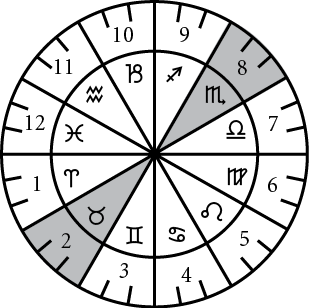
Taurus and Scorpio
Personal Property and Shared Resources
The second house of Taurus describes personal possessions, while the eighth house of Scorpio describes shared resources.
In tarot, Taurus is the Hierophant, and Scorpio is Death. The Taurus Hierophant wants to maintain his traditions and the status quo, but the angel of Death demands transfiguration and change. The Hierophant wants to hold on to all the spiritual and material treasure he’s accumulated; Death will eventually take them all away.
Taurus is ruled by Venus, the Empress’ planet of love and beauty. Scorpio is ruled by Pluto, Judgment’s planet of endings and new beginnings. They all find common ground in the graveyard: Death may have its way, but the Hierophant will enrich his church in the process, as a result of planned giving and bequests.
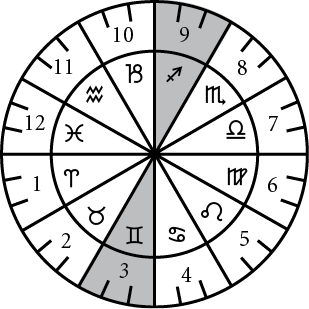
Gemini and Sagittarius
Self-Expression and the Higher Self
Gemini, the sign of communication and self-expression, finds its counterpart in Sagittarius, the sign of philosophy, higher education, and long-distance travel.
Curious Gemini wants to know and understand his neighbors, but far-sighted Sagittarius wants to meet foreigners. While Gemini busies himself with elementary education, Sagittarius wants to pursue an advanced degree. And when Gemini takes short trips and runs neighborhood errands, Sagittarius heads off on distant journeys.
In tarot, Gemini is represented by the Lovers, and Sagittarius is represented by Temperance. The Lovers want to plunge head-first into a relationship, but Temperance cautions them to take a more balanced approach, and to see the world before they commit to settling down.
Gemini is ruled by Mercury, the Magician’s planet of speed, skill, and communication. Sagittarius is ruled by Jupiter, the planet of luck and the Wheel of Fortune.
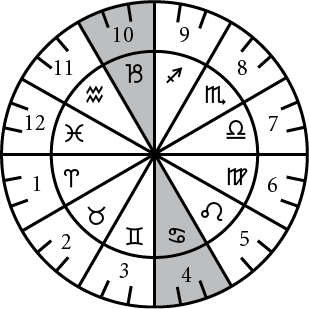
Cancer and Capricorn
Private versus Public
The fourth house of Cancer represents the privacy and comfort of home, while the tenth house of Capricorn describes the public face of career, social status, and reputation.
Cancer is safe and nurturing, and it praises personal achievements. Capricorn, however, makes those achievements visible, where they’re exposed to challenge and criticism. The two signs demonstrate the difference between unconditional love and public responsibility.
Cancer is the Charioteer, safely ensconced in a crablike shell. Capricorn is the Devil, facing the cold, cruel material world in exchange for recognition and reward.
Cancer is ruled by the Moon, the mystical planet of the High Priestess, while Capricorn is ruled by Saturn, the tarot’s World at large.
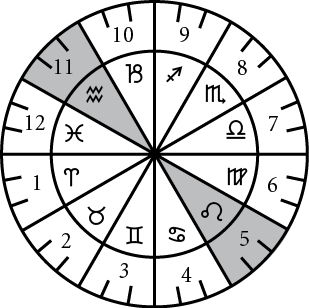
Leo and Aquarius
Instant Gratification versus Long-Range Planning
Leo, the sign of creativity and play, pairs off against Aquarius, the sign of long-range vision and planning.
In tarot, Leo is Strength, and Aquarius is the Star. Leo is the star of his own show, but Aquarius wants to be part of a constellation. Leo wants to play with his kids, but Aquarius is thinking about tomorrow’s children—so her work needs to start today. Leo wouldn’t mind a quick romp through the park, but Aquarius wants to organize a fundraiser.
Together, they should be able to find a happy medium. Leo is ruled by the Sun, the planet of creative self-expression. Aquarius is ruled by Uranus, the Fool’s planet of revolution and reform.
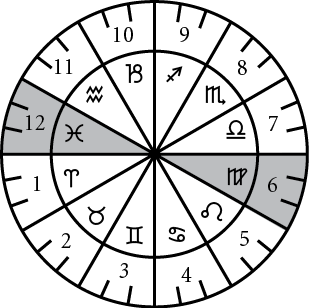
Virgo and Pisces
The Everyday World and the World of Dreams
Virgo, the sign of health, work, and service, finds its counterpart in Pisces, the sign of dreams and secrets.
Virgo is practical; Pisces is mystical. Virgo is intelligent; Pisces is intuitive. Virgo wants to control every detail of his existence, but Pisces would rather go with the flow. In short, Virgo focuses on the responsibilities of physical existence, while Pisces focuses on the rewards of spirituality.
In tarot, Virgo is the Hermit, and Pisces is the Moon. Left to their own devices, both could easily lose touch with reality.
Virgo is ruled by Mercury, the Magician’s planet of thought and communication. Pisces is ruled by Neptune, the Hanged Man’s planet of mysticism and illusion.
